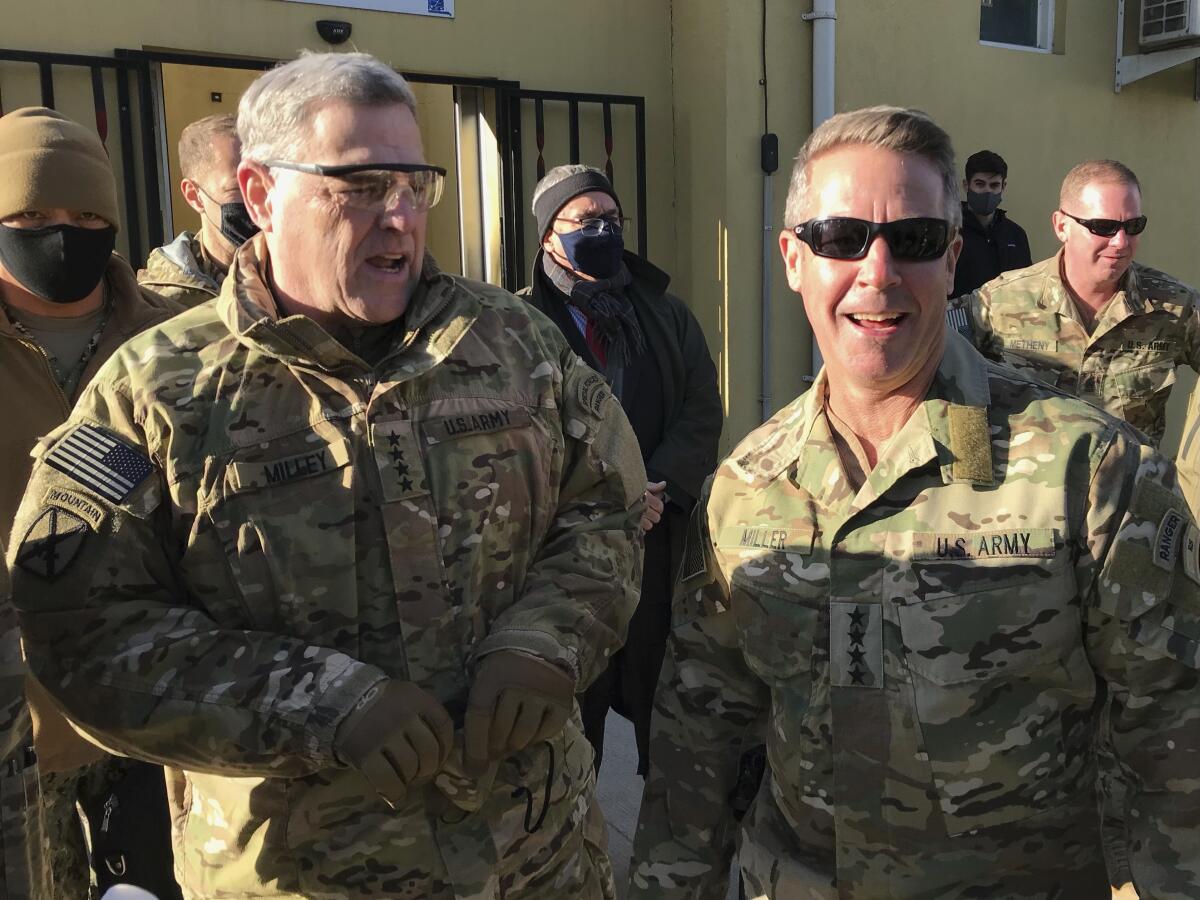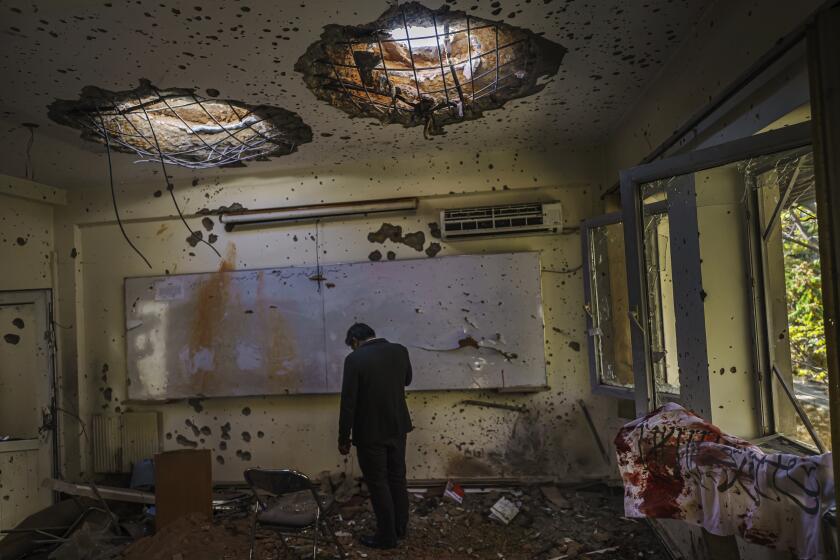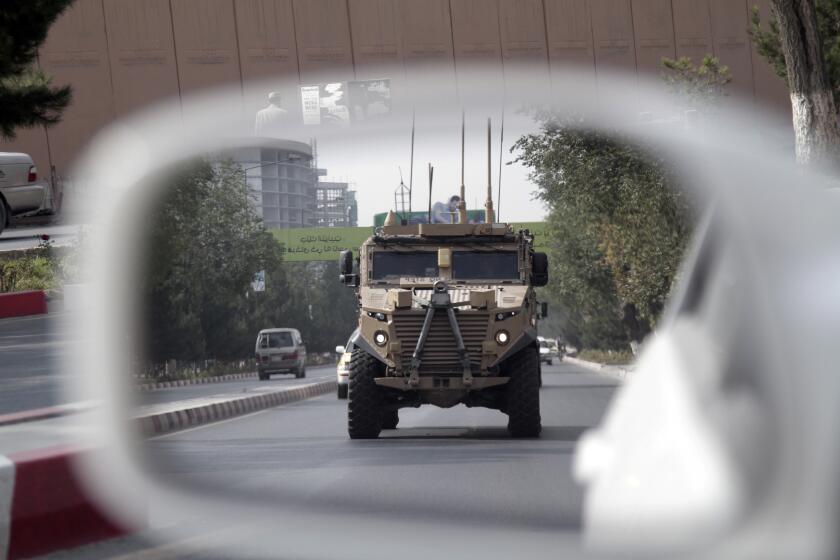U.S. Joint Chiefs of Staff chairman meets with Taliban on peace talks

KABUL, Afghanistan — America’s top general held unannounced talks with Taliban peace negotiators in the Persian Gulf to urge a reduction in violence across Afghanistan, even as senior U.S. officials in Kabul warned that stepped-up Taliban attacks endangered the militant group’s nascent peace negotiations with the Afghan government.
Army Gen. Mark A. Milley, chairman of the Joint Chiefs of Staff, met for about two hours with Taliban negotiators in Doha, Qatar, on Tuesday, then flew to Kabul on Wednesday to discuss the peace process with Afghan President Ashraf Ghani.
Milley’s meetings came amid a new drawdown of U.S. troops, although under current U.S. policy a complete pullout hinges on the Taliban reducing attacks nationwide.
“The most important part of the discussions that I had with both the Taliban and the government of Afghanistan was the need for an immediate reduction in violence,” Milley told a handful of reporters who accompanied him to Qatar and Afghanistan. “Everything else hinges on that.”
Under ground rules set by Milley for security reasons, the journalists traveling with him agreed not to report on either set of talks until he had departed the region. It was Milley’s second unannounced meeting with the Taliban’s negotiating team; the first, in June, also in Doha, had not been reported until now.
Although Milley reported no breakthrough, his Taliban meetings represent a remarkable milestone: America’s top general coming face-to-face with representatives of the group that ruled Afghanistan until it was ousted 19 years ago this month in the early stages of what became America’s longest war. Milley served three tours of duty in Afghanistan, the first in 2003 and the last in 2013-14.
U.S. troops are rushing to exit Afghanistan as the insurgency it never managed to defeat regains ground across much of the country.
Army Gen. Scott Miller, the top commander of U.S. and coalition forces in Afghanistan, said in an interview at his military headquarters in Kabul on Wednesday that the Taliban have stepped up attacks on Afghan forces, particularly in the southern provinces of Helmand and Kandahar, and against roadways and other infrastructure.
“My assessment is it puts the peace process at risk — the higher the violence, the higher the risk,” Miller said.
Miller meets at least once a month with Taliban negotiators as part of Washington’s effort to advance a peace process.
Speaking in the same interview, Ross Wilson, the ranking U.S. diplomat in Kabul, said he also sees growing risk from Taliban violence. He said it has created “an unbearable burden” on the Afghan armed forces and society as a whole.
The planned U.S. troop withdrawal from Afghanistan is rattling Washington’s allies and adversaries in the region.
In the so-called Doha agreement signed last February by the U.S. and the Taliban, the Trump administration agreed to a phased withdrawal of U.S. troops, going down to zero by May 2021 if the agreement’s conditions are upheld. One condition is a reduction in violence by the Taliban, leading to a nationwide cease-fire. The Taliban also agreed to begin peace negotiations with the Afghan government, which are in an early stage.
The Taliban has demanded a halt to U.S. airstrikes, which have been conducted since February only in support of Afghan forces under Taliban attack.
Miller said he was saddened by what he called the Taliban’s deliberate campaign to damage roadways, bridges and other infrastructure as part of their effort to limit the Afghan government’s ability to reinforce its troops.
“Military commanders on the ground are now starting to do things that are not conducive to peace talks and reconstruction and stability,” Miller said, adding: “Clearly, the Taliban use violence as leverage” against the Afghan government.
Young Afghans fear losing new freedoms and their lives to the Taliban as U.S. troops prepare to exit.
Miller said he is executing Trump’s order to reduce U.S. forces from 4,500 to 2,500 by Jan. 15, just days before President-elect Joe Biden is sworn in. Miller said troop levels are now at about 4,000 and will reach the 2,500 target on time.
Biden has not said publicly whether he will continue the drawdown or how he will proceed with the Doha agreement negotiated by Trump’s peace envoy, Zalmay Khalilzad.
Biden has not laid out a detailed plan for Afghanistan but has made clear that he prefers a small U.S. military footprint and limited goals. He has acknowledged that, as vice president, he dissented from President Obama’s decision in December 2009 to vastly increase troop levels in hope of forcing the Taliban to the peace table.
“I think we should only have troops there to make sure that it’s impossible for... ISIS or Al Qaeda to re-establish a foothold there,” Biden told CBS News in February.
More to Read
Sign up for Essential California
The most important California stories and recommendations in your inbox every morning.
You may occasionally receive promotional content from the Los Angeles Times.













